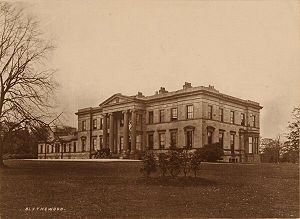
Baron Blythswood
Encyclopedia

Peerage of the United Kingdom
The Peerage of the United Kingdom comprises most peerages created in the United Kingdom of Great Britain and Ireland after the Act of Union in 1801, when it replaced the Peerage of Great Britain...
. It was created on 24 August 1892 for Sir Archibald Campbell, 1st Baronet
Archibald Campbell, 1st Baron Blythswood
Lieutenant-Colonel Archibald Campbell, 1st Baron Blythswood FRS was a Scottish Conservative politician....
, the former Member of Parliament
Member of Parliament
A Member of Parliament is a representative of the voters to a :parliament. In many countries with bicameral parliaments, the term applies specifically to members of the lower house, as upper houses often have a different title, such as senate, and thus also have different titles for its members,...
for Renfrew
Renfrewshire West (UK Parliament constituency)
West Renfrewshire was a county constituency of the House of Commons of the Parliament of the United Kingdom from 1885 to 1983 and again from 1997 until 2005...
, with remainder failing heirs male of his own to five of his younger brothers and the heirs male of their bodies (one brother, Robert Douglas-Campbell, was excluded from inheriting the title). He had already been created a Baronet, of Blythswood
Blythswood House
Blythswood House was a neoclassical mansion at Renfrew, Scotland. It was designed in 1821, by the eminent architect James Gillespie Graham for Archibald Campbell, the Member of Parliament for the Glasgow District of Burghs....
in the County of Renfrew, in the Baronetage of the United Kingdom on 4 May 1880. Born Archibald Douglas, he was the son of Archibald Campbell, 17th feudal baron of Mains and 12th feudal baron of Blythswood, a descendant of James Douglas (who had assumed the surname of Douglas in lieu of Campbell), son of John Campbell and Mary, daughter of John Douglas of Mains. John Campbell was the son of Colin Campbell ,1st feudal Baron of Blythswood. Lord Blythswood's father was born Archibald Douglas, but had assumed by Royal license the surname of Campbell in lieu of his patronymic in 1838 on succeeding to the Blythswood estate on the death of his cousin, Archibald Campbell.
Lord Blythswood was childless and on his death in 1908 the baronetcy became extinct. He was succeeded in the barony according to the special remainder by his younger brother Reverend Sholto Douglas, the second Baron. On succeeding in the barony he assumed by Royal license the surname of Campbell in lieu of his patronymic. He was also childless and was succeeded by his younger brother Barrington Douglas-Campbell, the third Baron. He was a Major-General in the British Army
British Army
The British Army is the land warfare branch of Her Majesty's Armed Forces in the United Kingdom. It came into being with the unification of the Kingdom of England and Scotland into the Kingdom of Great Britain in 1707. The new British Army incorporated Regiments that had already existed in England...
. He had assumed the additional surname of Campbell by Royal license in 1908 but on his succession to the barony in 1916 he assumed the surname of Campbell only by Royal license. On his death the title passed to his eldest son, the fourth Baron. He was a Brigade Major
Brigade Major
In the British Army, a Brigade Major was the Chief of Staff of a brigade. He held the rank of Major and was head of the brigade's "G - Operations and Intelligence" section directly and oversaw the two other branches, "A - Administration" and "Q - Quartermaster"...
in the British Army. He assumed the additional surname of Campbell by Royal license in 1908 but on succeeding in the barony on the death of his father in 1918 he assumed by Royal license the surname of Campbell only. He had no sons and was succeeded by his younger brother, the fifth Baron. He died unmarried and was succeeded by his younger brother, the sixth Baron. He assumed by Royal license the surname of Douglas-Campbell in 1929 but on succeeding in the barony in 1937 he assumed the surname of Campbell only by Royal license. The title became extinct on the early death of his son, the seventh Baron, in 1940.
Campbell Baronets, of Blythswood (1880)
- Sir Archibald Campbell, 1st BaronetArchibald Campbell, 1st Baron BlythswoodLieutenant-Colonel Archibald Campbell, 1st Baron Blythswood FRS was a Scottish Conservative politician....
(1835–1908) (extinct) (created Baron Blythswood in 1892)
Barons Blythswood (1892)
- Archibald Campbell, 1st Baron BlythswoodArchibald Campbell, 1st Baron BlythswoodLieutenant-Colonel Archibald Campbell, 1st Baron Blythswood FRS was a Scottish Conservative politician....
(1835–1908) - Sholto Campbell, 2nd Baron Blythswood (1839–1916)
- Barrington Bulkeley Campbell, 3rd Baron BlythswoodBarrington Campbell, 3rd Baron BlythswoodMajor-General Barrington Bulkeley Campbell, 3rd Baron Blythswood, KCB CVO was a British Army officer.-Military career:...
(1845–1918) - Archibald Douglas, 4th Baron BlythswoodArchibald Douglas, 4th Baron BlythswoodBrig.-Maj. Archibald Campbell, 4th Baron Blythswood KCVO was the son of Maj.-Gen. Sir Barrington Bulkeley Campbell, 3rd Baron Blythswood, and grandson of Archibald Douglas of Mains....
(1870–1929) - Barrington Sholto Douglas Campbell, 5th Baron Blythswood (1877–1937)
- Leopold Colin Henry Douglas Campbell, 6th Baron Blythswood (1881–1940)
- Philip Archibald Douglas Campbell, 7th Baron Blythswood (1919–1940)

